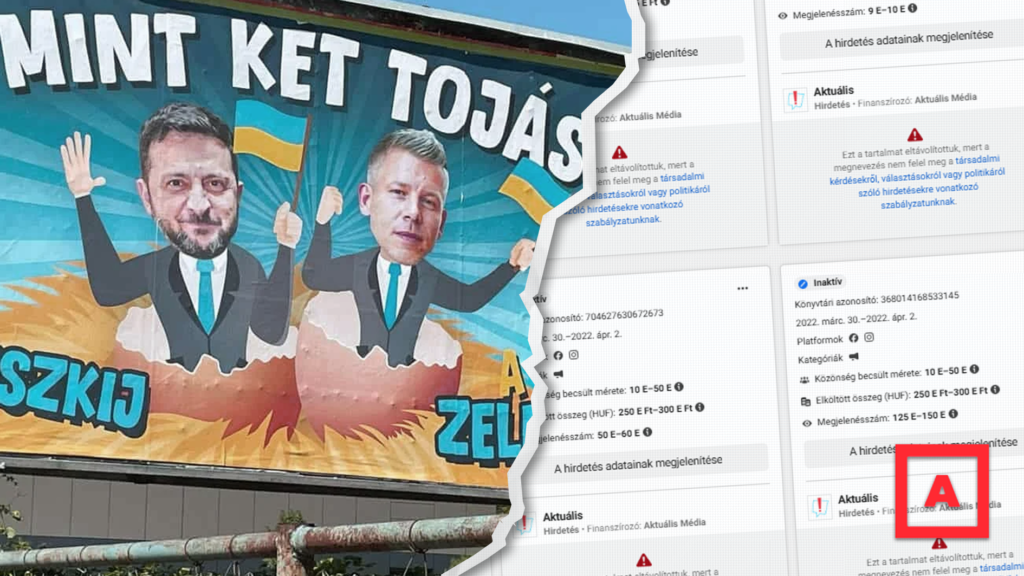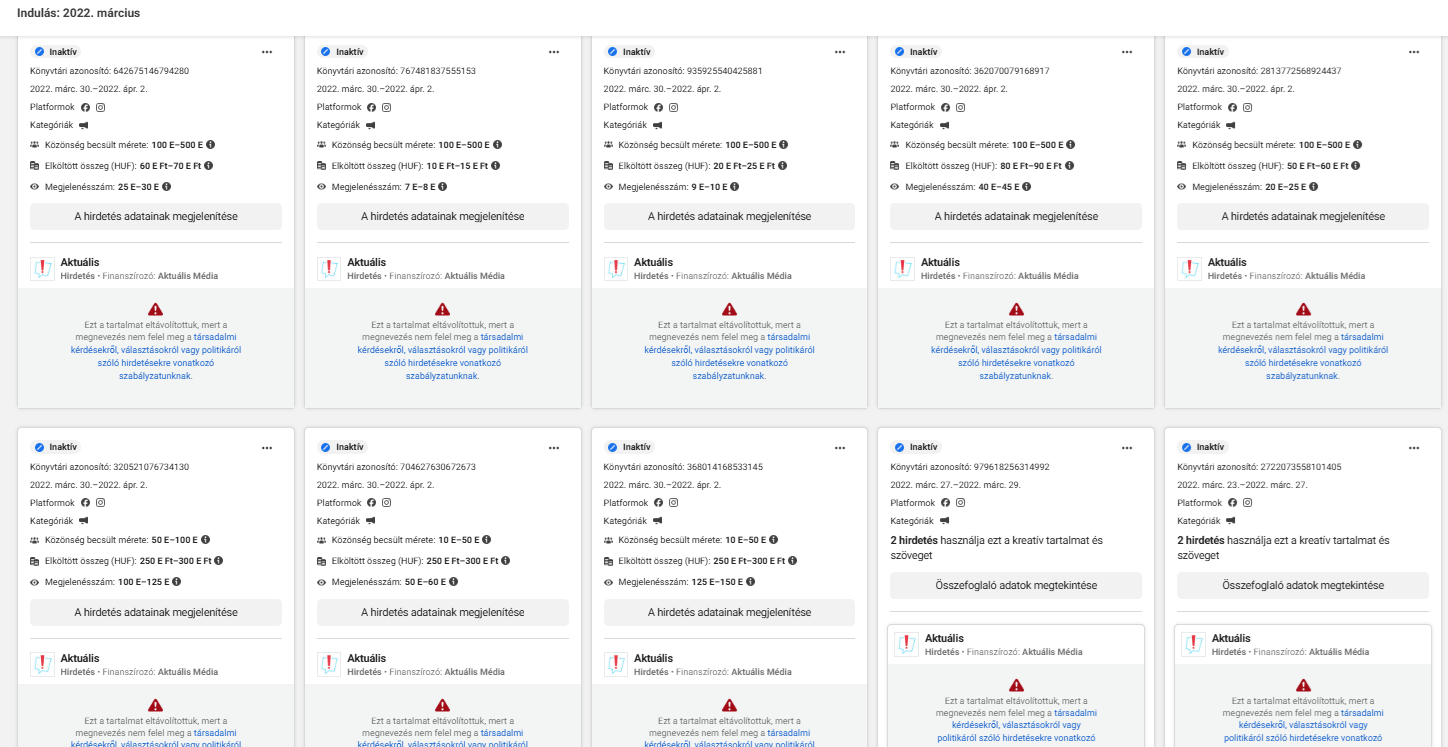The https://english.atlatszo.hu use cookies to track and profile customers such as action tags and pixel tracking on our website to assist our marketing. On our website we use technical, analytical, marketing and preference cookies. These are necessary for our site to work properly and to give us inforamation about how our site is used. See Cookies Policy
Meta, Google take dark money for campaign targeting Ukraine and Hungarian opposition
A recently created company is spending hundreds of thousands of Euros on advertisements attacking the opposition politician Péter Magyar, along with Volodymyr Zelensky, many times more than their reported earning, without disclosing their source of funding. Meta eventually removed a slew of similar ads targeting Viktor Orbán’s opponents for terms of service violations – but only after taking millions in dark money and showing the ads to millions of users.
In an ongoing paid ad campaign, shown to millions of Facebook, Instagram, and YouTube users, an animated ad depicts Ukrainian President Volodymyr Zelensky, along with Hungarian opposition leader Péter Magyar as trash to be dumped out. At the same time, hundreds of posters using similar graphics blanket Hungarian public areas, depicting the two men holding Ukrainian flags – attempting to smear Magyar as a supporter of Ukraine, evidently something to be ashamed of according to supporters of Viktor Orbán.

The posters and videos echo a similarly cartoonish smear campaign launched just before the 2022 Hungarian elections, targeting the opposition’s PM candidate at the time, Péter Márky-Zay. Although they clearly advance the interest of Orbán’s Fidesz party, these ads were not published by them, nor the government, but by private companies. The recent Magyar/Zelensky ads for example are run by a so-called “Resistance Movement Non-Profit Ltd.”, a company that was only registered last year, with a starting capital of only 7500 Euros. Despite that, it now inexplicably has access to hundreds of thousands of Euros – where that money came from, the company refused to disclose.
Video advertised by Resistance Movement Ltd. on YouTube.
However, we know where it goes to: American social media companies Meta and Google earn a fortune from these smear campaigns via their paid ads program, even as these campaigns likely violate terms of service.
Intentionally opaque finances
Company record procured by Átlátszó show that Resistance Movement Non-Profit Ltd. (Ellenállás Non-profit Kft.) was founded in 2024 and has only one member, Bence Apáti, a pro-government media personality. As the companies address, he registered the headquarters of a law firm formerly owned by Bence Tuzson, Hungary’s current Minister of Justice. The registration document also show that Apáti can use the law firm’s office for free.
In its financial report, the company closed with a balance sheet total of HUF 22.45 million (EUR 56,300 Euros) with a net profit of HUF 19.4 million (EUR 48,640). The source of this income is already unknown, and just in recent weeks, the company somehow found upon hundreds of thousands of Euros of additional funds to spend on campaigning.
According to the Meta Ads Library, Resistance Movement Ltd. spent about HUF 32.2 million HUF (EUR 80,236) on Facebook and Instagram ads in July this year. According to the Google Ads Transparency Center database, the company spent even more, around HUF 70 million (EUR 175,516), on advertising 6 YouTube videos. The largest amount, around HUF 24 million, was spent on the “Like two eggs” video depicting Peter the Hungarian and Zelensky as trash to be dumped
– in the 30-day period before July 12, this was the most expensive political ad shown on Google’s platforms.
Evidently, the company attempted to hide its spending, as it originally classified its ads as ‘business ads’, to which Google’s ad transparency policies do not apply. However, the classification was later changed to ‘political’, revealing the cost.
It is not known how much the company spends on street advertising, but even the most conservative estimate puts the cost in the hundreds of thousands of Euros. Based on the cheapest market prices, a relatively small national campaign of just 500 billboards and 1,000 citylights would cost at least HUF 107.5 million (EUR 270,000).
We emailed the sole member of the Resistance Movement Ltd., Bence Apáti, asking where they got the money for the current campaigns. This is a pertinent question, not least because the Hungarian government attaches great importance to the financial transparency of organisations that influence public life – as the recently proposed “transparency law” clearly shows.
Until the publication of this article, Apáti did not reveal where funding came from, nor did he answer whether the Ltd. received public funds or money from abroad. For comparison, Átlátszó, which the ruling party smeared as “foreign agents” who need to be exposed, accurately reports earnings, including international subsidies, as can be seen here.
Hundreds of ads removed only after the campaign was over
Resistance Movement Ltd.’s was not the only opaquely funded smear campaign in recent Hungarian politics. In March, a page called ‘Aktuális’ also started advertising again on Meta’s social media platforms, also attacking Ukraine along Péter Magyar. This is notable for several reasons.
The page and the brand Aktuális are the same that smeared opposition leaders in 2022. At the time, a company named Aktuális Media Non-Profit Ltd. was registered by a different pro-regime media figure. The company would then spend a fortune from an indeterminable source, only to be shut down just before the election.
Since 2022, Aktuális has been inactive for years, but in recent months, it returned with a slew of paid ads with titles like “Péter Magyar and co. are no longer just applauding the war, they would send weapons “, “TISZA (name of Magyar’s party) would admit Ukraine to the EU! Do you think that’s okay?” In March, these ads cost HUF 14.8 million (37,100 EUR), in April-May, more than double this amount, HUF 31.8 million (EUR 77,700), followed by a more modest campaign in June, with HUF 3.3 million (EUR 8270).
Who is funding the ads now is anyone’s guess.
In the Meta Ad Library, the sponsor is listed simply as “Aktuális”, despite the fact that the company attached to the brand no longer exists.
The Meta Ad Library also shows that close to all of the 2022 smear ads ran by Aktuális were removed by Meta because “did not meet the criteria for ads about social issues, elections or politics”. Looking at the ads’ content and the Terms of Service, two possibilities are likely: either the ads broke the rule prohibiting false portrayals of real persons, or because the page’s administrators failed to disclose who provided funding for the ads.
However, rules mean little if they are only enforced long after the ads are being shown to anyone. In the case of Aktuális, the ads were removed long after the 2022 elections were over, so the content was only removed from Meta’s archives. Prior to that, Meta showed the ads to millions of users, and took vast sums of money for them.
It is also clear that breaking the rules repeatedly have no long-term ill effects on advertisers. Although the ‘Aktuális’ page had hundreds of their ads removed for rules violations, they can continue to sponsor similar campaigns.
Written and translated by Zalán Zubor. The original Hungarian story can be found here. Cover photo by Csaba Segesvári.
Share:
Your support matters. Your donation helps us to uncover the truth.
- PayPal
- Bank transfer
- Patreon
- Benevity
Support our work with a PayPal donation to the Átlátszónet Foundation! Thank you.
Support our work by bank transfer to the account of the Átlátszónet Foundation. Please add in the comments: “Donation”
Beneficiary: Átlátszónet Alapítvány, bank name and address: Raiffeisen Bank, H-1054 Budapest, Akadémia utca 6.
EUR: IBAN HU36 1201 1265 0142 5189 0040 0002
USD: IBAN HU36 1201 1265 0142 5189 0050 0009
HUF: IBAN HU78 1201 1265 0142 5189 0030 0005
SWIFT: UBRTHUHB
Be a follower on Patreon
Support us on Benevity!



